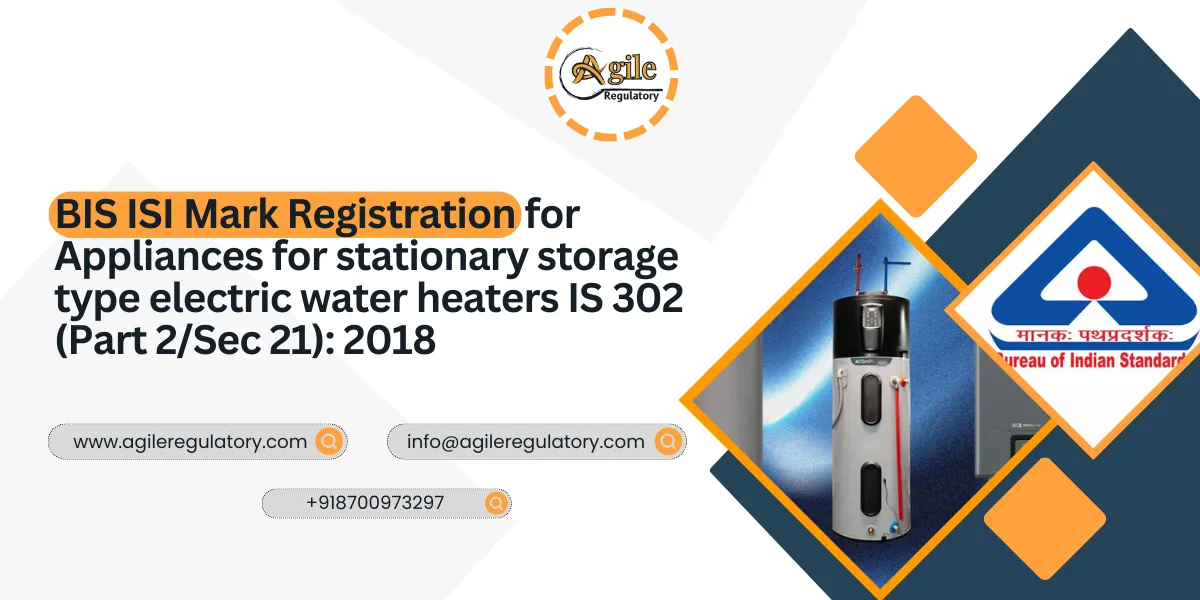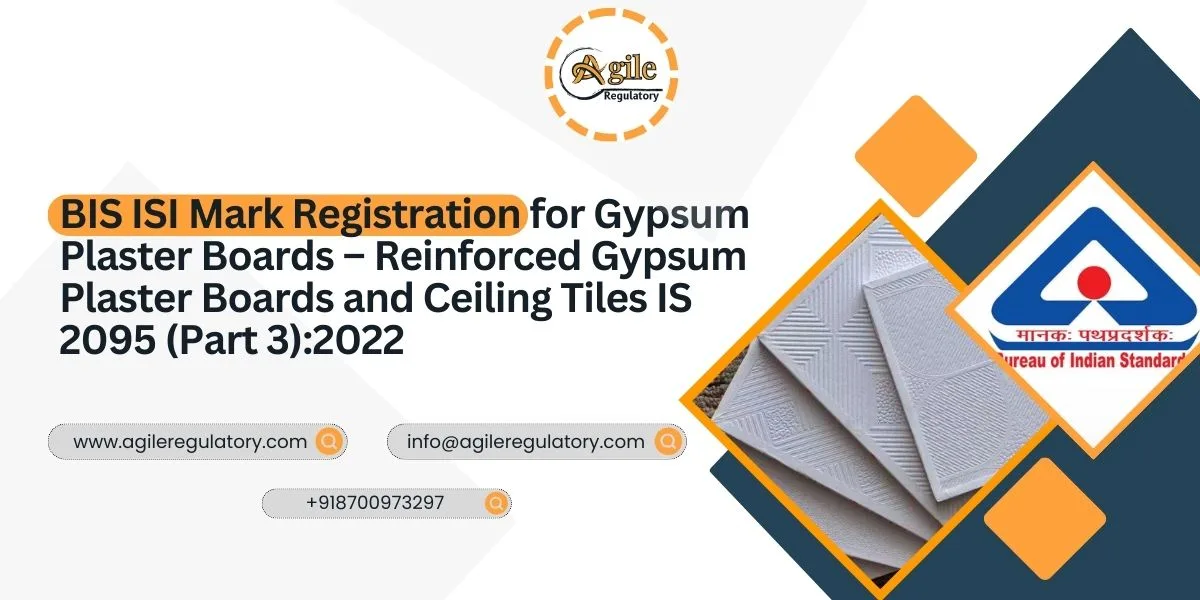
Get Instant Solution By an Expert Advisor
(4.8)


A BIS (Bureau of Indian Standards) Certificate is like a quality stamp given by an organization in India called the Bureau of Indian Standards. It's given to products that meet specific standards and rules set by the BIS. This accreditation guarantees the high caliber, safety, and functionality of the products. A product must pass extensive testing and inspection to ensure that it satisfies the BIS requirements in order to receive the Bureau of Indian Standards Certificate.
In addition to being required for various items in India, a BIS Certificate verifies to customers that the product is reliable and upholds industry standards for quality. It's crucial for both domestic and international trade and functions similarly to a mark that increases consumer trust in the goods.
The BIS CRS (Compulsory Registration Scheme) Certificate is like a special stamp given by the Bureau of Indian Standards (BIS) for certain electronic products that are sold in India. This stamp means that the products have passed important safety and quality tests set by the BIS. It's kind of like a guarantee that the products are safe to use and meet specific technical standards.
For companies making or bringing electronic products into India, getting this certificate is a must. it's a legal requirement. Having a BIS CRS Registration Certificate makes sure that all companies follow the quality standards and that the products you buy are of good quality.
So, when you see a product with a BIS CRS Certificate, you can trust that it's safe and meets the standards set by the Indian government.
The BIS ISI (Indian Standards Institution) Mark Certificate is a hallmark of product quality and safety in India, administered by the Bureau of Indian Standards (BIS). Awarded through a rigorous certification process, the ISI Mark is affixed to products that comply with specific standards and regulations set by the BIS, ensuring their reliability, safety, and adherence to prescribed norms.
This certification spans a wide range of products, including household items, electrical appliances, and industrial goods. The BIS ISI Mark signifies that a product has undergone meticulous testing and quality assessments, assuring consumers that it meets the established benchmarks for performance and safety.
Manufacturers displaying the ISI Mark demonstrate their commitment to producing goods of superior quality, instilling confidence in consumers and contributing to fair trade practices. In essence, the BIS ISI Mark Certificate is not just a symbol of conformity; it's a testament to a product's reliability and compliance with the stringent quality standards mandated by the BIS, enhancing consumer trust in the Indian market.
A BIS (Bureau of Indian Standards) Certificate for Foreign Manufacturers is a regulatory approval issued by the BIS, India's national standards body, allowing foreign manufacturers to sell specific products in the Indian market. This certification is crucial for ensuring that imported goods meet the prescribed Indian standards for safety, quality, and performance.
Foreign manufacturers must undergo a thorough evaluation of their products, involving testing, inspection, and verification processes to demonstrate compliance with BIS norms. The BIS Certificate for Foreign Manufacturers acts as evidence that the products adhere to Indian standards, fostering consumer confidence and facilitating international trade.
This certification streamlines the import process, contributing to fair trade practices by ensuring that foreign goods entering the Indian market meet the same stringent standards as locally produced items. It serves as a testament to a foreign manufacturer's commitment to delivering products that align with the quality expectations set by the BIS and the Indian regulatory framework.
The BIS (Bureau of Indian Standards) Hallmark Certificate is a mark of trust and quality assurance for precious metal articles in India. Administered by the BIS, this certification ensures that gold, silver, and other precious metal products meet defined purity and fineness standards.
Obtaining the BIS Hallmark involves rigorous testing and analysis of the precious metal content, assuring consumers of the accuracy of the declared purity. This certification is not only a testament to the authenticity of the precious metal but also a legal requirement for selling such articles in India.
The BIS Hallmark Certificate serves as a guarantee of the quality and purity of the precious metal, providing consumers with confidence in their purchases. It plays a crucial role in standardizing the precious metal market, promoting fair trade practices, and safeguarding consumers against counterfeit or substandard products in the jewelry and bullion industry.
The Recognition of Assaying and Hallmarking Centre is a formal acknowledgment granted to facilities involved in testing and certifying the purity of precious metals, such as gold and silver. Issued by regulatory bodies or standardization organizations, this recognition signifies that the Assaying and Hallmarking Centre adheres to specified standards and practices in accurately determining the composition and quality of precious metal articles.
The recognition involves a thorough assessment of the facility's testing methods, equipment, and competence in maintaining the integrity of the hallmarking process. It plays a pivotal role in ensuring the credibility and reliability of hallmarking procedures, instilling confidence in consumers and traders regarding the authenticity of precious metal products.
The Recognition of Assaying and Hallmarking Centre is essential for maintaining transparency and trust in the precious metals market, as it verifies that hallmarking procedures are conducted with precision and in compliance with established quality standards.
The BIS Ecomark Certificate is a distinctive certification granted by the Bureau of Indian Standards (BIS) to products that demonstrate environmental sustainability and adherence to ecological standards. Designed to promote green and eco-friendly practices, the Ecomark Certification signifies that a product has met specific environmental criteria set by the BIS.
This includes factors such as reduced environmental impact, energy efficiency, and the use of environmentally friendly materials. Obtaining the BIS Ecomark involves a comprehensive evaluation process, ensuring that the product aligns with the defined ecological benchmarks. This certification not only indicates a commitment to environmental responsibility by the manufacturer but also serves as a guide for environmentally conscious consumers seeking eco-friendly products in the Indian market.
The BIS Ecomark Certificate thus plays a vital role in encouraging sustainable production practices and fostering awareness about the environmental impact of consumer goods.
BIS (Bureau of Indian Standards) certificate is like a stamp of approval for products, showing they meet high-quality and safety standards in India. It's not just about protecting consumers but also about companies committing to set standards. The tough evaluations and strict criteria make sure that products with the BIS Certificate meet the required quality and safety levels, making people and stakeholders trust them.
This certificate is a sign of excellence, making it easier for products to enter the market and building trust among customers. Basically, having a BIS certification means a company is actively working to ensure their products are top-notch in quality and safety, making them reliable in the marketplace.

 Vanshika Mathur
Vanshika Mathur
17 Feb, 2026

 Divya Saxena
Divya Saxena
17 Feb, 2026



 Vanshika Mathur
Vanshika Mathur
16 Feb, 2026

Get Instant Solution By an Expert Advisor
(4.8)
We simplify compliance through a proven 4-step process: Consultation, Documentation, Submission, and certification. From understanding requirements to getting final approvals, we deliver a smooth, timely, and fully compliant journey for your business.
What our customer says about us
Fantastic support from the team. Their expertise transformed our approach, driving remarkable outcomes. A must-have partner for businesses seeking effective consulting solutions. Highly recommended.

KTPL Instruments
Agile Regualtory delivers exceptional solutions. Their insightful guidance streamlined our processes and boosted profitability. Highly recommended for businesses seeking expert consulting services to thrive.

Justrack IOT
Impressed by Agile Regulatory's expertise. Their strategic insights and practical solutions have elevated our business operations. A reliable partner for effective consulting services. Highly recommended for growth-focused businesses.

Coaire Compressor
Extraordinary consulting services. Their insightful solutions and dedicated team reshaped our business, driving remarkable improvements. Highly recommend it for transformative results.

Easy Polymer
Incredible experience with Agile Regulatory. Their innovative strategies and expert advice revitalized our business model, resulting in impressive growth. Highly recommend their exceptional consulting services.

Tarus International
Top-tier consulting! offered strategic solutions that revolutionized our approach. Their deep expertise and personalized guidance made a significant impact on our success. Highly recommend their services.

Anchor Weighing
Agile Regulatory exceeded expectations! Their tailored solutions, expertise, and proactive approach led to remarkable results. Highly recommend for businesses seeking impactful and strategic guidance.

AM Capacitor
Outstanding service! delivered targeted solutions with professionalism and expertise. Their insights elevated our business strategies, resulting in noticeable growth. Highly recommended for exceptional consultation.

Imaxx Pro Aquistic
Leave a Reply
Your email address will not be published. Required fields are marked *